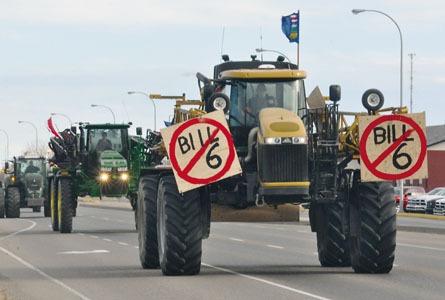Current Temperature
Ripple effect large for carbon tax; Shields/Hunter
Posted on May 10, 2017 by Taber Times TIMES FILE PHOTO
TIMES FILE PHOTOBy Trevor Busch
Taber Times
tbusch@tabertimes.com
The impact on value-added agricultural processing and other manufacturing in the area due to the province’s carbon tax could have far-reaching implications when considering bottom lines.
During a roundtable discussion with Bow River MP Martin Shields in Municipal District of Taber council chambers in late April, the conversation started out considering some the implications of the 2017 federal budget, but drifted into discussion of the provincial carbon tax.
“With all these major oil companies pulling out of the oil sands, is that anything to do with the budget?” questioned Coun. Ben Elfring. “Has there been such a change in the federal budget? There’s got to be a reason these guys are pulling out.”
Cardston-Taber-Warner MLA Grant Hunter, who attended the roundtable, suggested the Notley NDP’s carbon tax is the culprit for increasing consolidations and sales involving major players in the oil sands region.
“This carbon tax has got them pretty squirrely. You just can’t compete against the United States. You can get into the ground with shale operations just south of the border in a month. So you can be in and out. You just can’t compete. And the corporate tax increase.”
Shields weighed in, suggesting the impact of a carbon tax is felt at the grassroots level long before it will ever be felt in the corporate boardrooms of energy producers.
“It’s easy for these guys, the CEOs of the major companies, to stand up there with the New Democrats and the federal government and say we support this carbon tax,” said Shields.“Well, their bonus payment was $7 or $8 million this year. It’s easy for those guys to stand up there, but the rest of us in the municipalities… they don’t make that connection of what it costs. It comes back to the property taxpayers who are going to be footing the bill.”
Using just one example that has trickled down to the municipal level, Elfring noted increased costs for seniors is a concern.
“It’s not only that, it’s the seniors lodges — it’s a trickle down effect, and its starting to hit the bottom for people that can’t really afford it, or are on fixed incomes.”
For the nation to actually meet its climate change commitments, speculative figures of up to $300 per tonne for a carbon tax were suggested and discussed at the roundtable.
Town of Taber CAO Cory Armfelt, who also participated in the roundtable, indicated this would be entirely unsustainable for many area businesses and processors.
“Hearing $300 per tonne is where the backstop on the carbon tax is going to be? That’s scary for agri-businesses in this town, Lamb-Weston, Frito-Lay, Lantic, McCains, go up and down the highway — all these guys are gone. We’ve had visits from our industrial producers already in council, and they’ve said that with the lack of incentive — there’s no carrot, only a stick. In the corporate boardrooms where these things are controlled at, that conversation is going on right now. Even where we’re at right now provincially, with the amount of capital that’s being pulled out of our value-added agriculture businesses now? The guys in Montreal are saying why are we processing sugar beets in Taber right now? It makes no sense.”
From his perspective, Reeve Brian Brewin summed up the implications of the carbon tax.
“We’ve lost the advantage that we had, and that was cheaper power and cheaper gas. It’s no longer there.”
Leave a Reply
You must be logged in to post a comment.

